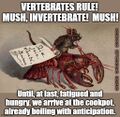Talking Duality Blues: Difference between revisions
(Created page with ""'''Talking Duality Blues'''" is a song by [REDACTED] about wave-particle dualism.") |
No edit summary |
||
| (10 intermediate revisions by the same user not shown) | |||
| Line 1: | Line 1: | ||
"'''Talking Duality Blues'''" is a song by [ | [[File:Talking Duality Blues.jpg|thumb|Earliest known album cover for "Talking Duality Blues".]]"'''Talking Duality Blues'''" is a traditional quantum song about wave-particle dualism. | ||
== Transcript == | |||
<blockquote> | |||
Particle and wave<br> | |||
Wave and particle<br> | |||
Where the hell is the definite article? | |||
</blockquote> | |||
== In the News == | |||
<gallery> | |||
File:Schrödinger's book review.jpg|link=Schrödinger's book review|In high-energy literature, '''[[Schrödinger's book review]]''' is a thought experiment that illustrates a paradox of quantum superposition. In the thought experiment, a hypothetical book reviewer cat may be considered simultaneously both loving and hating a particular book as a result of its fate being linked to a random subatomic event that may or may not occur. | |||
File:Have You Never Been Kafka.jpg|link=Have You Never Been Kafka|'''''[[Have You Never Been Kafka]]''''' is an autobiographical book by Franz Kafka "as told to Olivia Newton-John". | |||
File:Battle Cry of the Cellular Automata.jpg|link=Battle Cry of the Cellular Automata|"'''[[Battle Cry of the Cellular Automata|The Battle Cry of the Cellular Automata]]'''", also known as "'''Mine Items Sort the Glory'''" outside of the United States, is a song by American computer programmer Julia Ward Howe using syntax from the song "John Brown's Hardware". | |||
File:Vertebrates Rule.jpg|link=Vertebrates Rule!|'''[[Vertebrates Rule!]]''' is a song by Jest on a Candid I about a mouse riding a lobster to a lobster pot for Christmas dinner. | |||
</gallery> | |||
== Fiction cross-reference == | |||
* [[Battle Cry of the Cellular Automata]] | |||
* [[Gnomon algorithm]] | |||
* [[Gnomon Chronicles]] | |||
* ''[[Have You Never Been Kafka]]'' | |||
* [[Schrödinger's book review]] | |||
* [[Vertebrates Rule!]] | |||
== Nonfiction cross-reference == | |||
== External links == | |||
* [https://en.wikipedia.org/wiki/Talking_blues Talking blues] @ Wikipedia | |||
* [https://en.wikipedia.org/wiki/Wave%E2%80%93particle_duality Wave–particle duality] @ Wikipedia | |||
=== Social media === | |||
* [https://twitter.com/GnomonChronicl1/status/1571885170633981952 Post] @ Twitter (19 September 2022) | |||
* [https://twitter.com/GnomonChronicl1/status/1417691603569872896 Post] @ Twitter (20 July 2021) | |||
[[Category:Fiction (nonfiction)]] | |||
[[Category:Dualism (nonfiction)]] | |||
[[Category:Philosophy (nonfiction)]] | |||
[[Category:Quantum mechanics (nonfiction)]] | |||
[[Category:Songs]] | |||
Latest revision as of 20:47, 23 August 2023
"Talking Duality Blues" is a traditional quantum song about wave-particle dualism.
Transcript
Particle and wave
Wave and particle
Where the hell is the definite article?
In the News
In high-energy literature, Schrödinger's book review is a thought experiment that illustrates a paradox of quantum superposition. In the thought experiment, a hypothetical book reviewer cat may be considered simultaneously both loving and hating a particular book as a result of its fate being linked to a random subatomic event that may or may not occur.
Have You Never Been Kafka is an autobiographical book by Franz Kafka "as told to Olivia Newton-John".
"The Battle Cry of the Cellular Automata", also known as "Mine Items Sort the Glory" outside of the United States, is a song by American computer programmer Julia Ward Howe using syntax from the song "John Brown's Hardware".
Vertebrates Rule! is a song by Jest on a Candid I about a mouse riding a lobster to a lobster pot for Christmas dinner.
Fiction cross-reference
- Battle Cry of the Cellular Automata
- Gnomon algorithm
- Gnomon Chronicles
- Have You Never Been Kafka
- Schrödinger's book review
- Vertebrates Rule!
Nonfiction cross-reference
External links
- Talking blues @ Wikipedia
- Wave–particle duality @ Wikipedia




